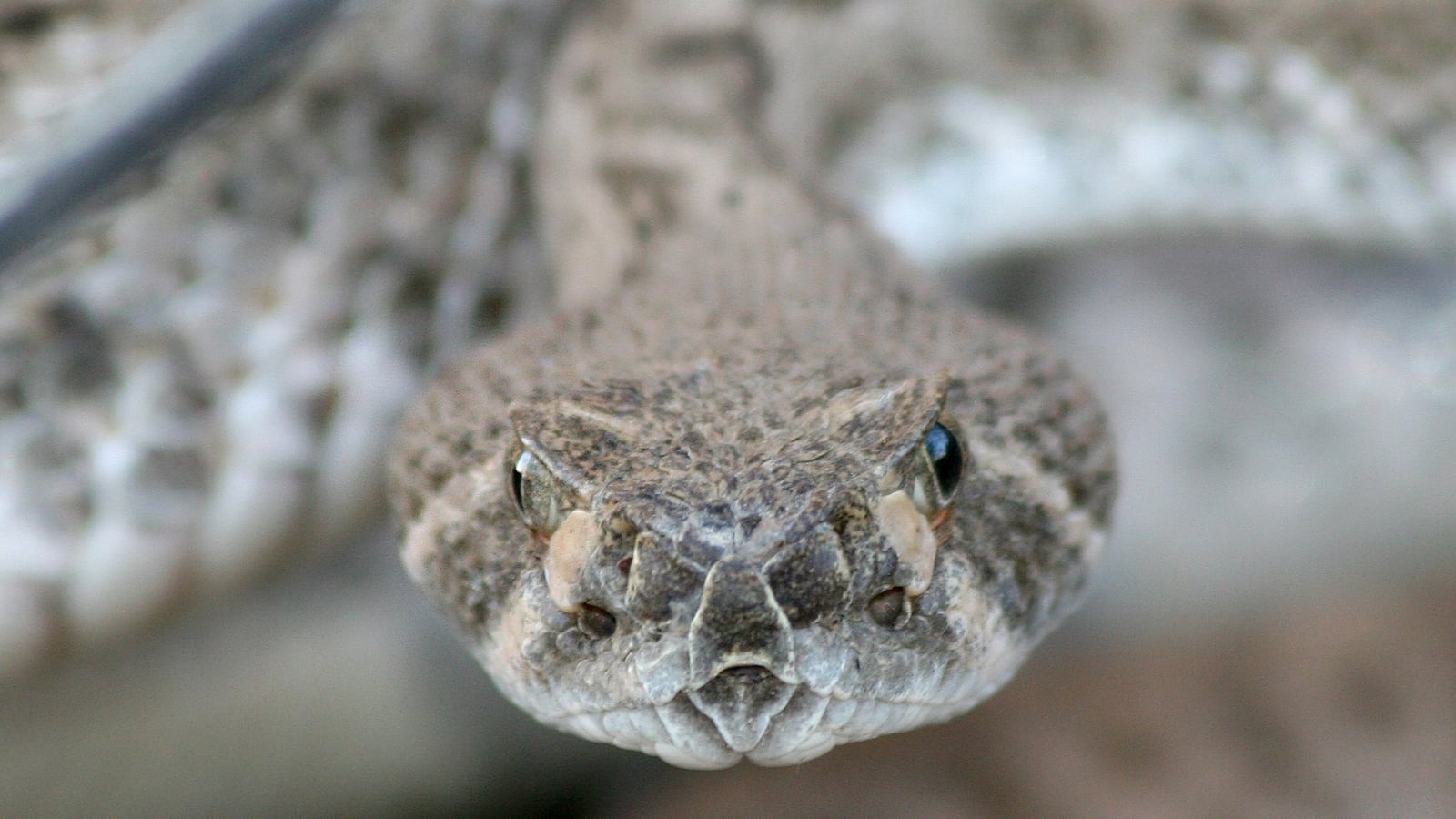The West Texas town of Sweetwater probably isn’t high on your list of places to visit. That's understandable: one of the highest-rated restaurants in the city of 11,000 is a Whataburger, and TripAdvisor lists a Baptist church as a top attraction. But they make up for this small-town sleepiness once a year, when the population doubles, triples, and even quadruples with spectators and a scaly bloodlust fills the air.
You see, in addition to being right in the middle of a lot of not very much, Sweetwater is also the heart of diamondback rattlesnake territory. And every year for over half a century, the town has held the Jaycees’ Rattlesnake Roundup, gathering thousands of the angrily buzzing venomous vipers and surreptitiously slaughtering them for the public good. And, of course, for a good time.
Back in 1958 local physicians were treating upwards of 50 snakebites a year and cattle were dropping like flies, dying of suffocation after their grass-snuffling noses swelled up from rattlesnake bites. In an effort to halt what they saw as rattler overpopulation, the Junior Chamber of Commerce, or “Jaycees” for short, organized a massive cull, a community-supported hunt that went on to become a tradition: equal parts country fair and slaughterhouse. It has grown to be the biggest event in Sweetwater, and, as the self-anointed largest rattlesnake roundup in the world, a Texas tradition. And it’s happening right now through Sunday.
Five thousand pounds of snakes, half the statewide take, are rousted from their hiding places by hunters who flock from all over. This time of year the reptiles are often lulled into a listless lurking, but the hunters use copper tubes to pump gasoline fumes into holes and rocky crevasses, flushing the animals into the open and capturing them.
They’re then kept alive until the Roundup, where they’re dumped into a holding snake pit. Sex and weight data is recorded for each, and their poisonous venom is milked, to be sold to pharmaceutical companies. The snakes are then euthanized with a bolt to the head, beheaded by blade-wielding Jaycees on bloody stumps, and “processed,” which is a polite way of saying skinned and gutted—various organs are also sold overseas. It’s a gory procedure, as one journalist described:
“The snake’s tiny hearts are set aside into a gory pile, each one still beating out its own rhythm—a hundred little pebble-sized hearts still twitching with life.”
The long filets of meat are then deep fried and served up to salivating onlookers for around $5, or heaped high for the annual rattlesnake eating contest.
Watching the rattlesnakes get milked in order to make anti-venom #RattlesnakeRoundup pic.twitter.com/gxNssVh1Ba
— Madeline Montgomery (@Madnmont) March 11, 2016
Like any event of its kind, it’s not without its detractors. Animal-rights groups have long protested the gory gala, describing scenes of horrible cruelty. Protestors turn out to picket, major news outlets such as CNN run anti-Roundup op-ed pieces, and even venerable National Geographic is calling for a halt, albeit in the name of snake friendship.
Since only around five people die from snakebites in the United States every year—half the number of lightning-strike victims—it seems the justification for the weekend-long party may be getting long in the tooth, especially to animal lovers.
“It’s about money,” Michael Price, a local herpetologist who has been working in the area for a quarter-century, told the Midland Reporter Telegram. “It’s become such a tradition, and it brings in a tremendous amount of money to the community. That’s my biggest issue; it’s not about population control, and it’s not about safety. It’s about money, and it is what it is.”
Long past the guise of population control, the Roundup is now as much about the town’s survival as it is killing snakes.
Every aspect of the event has been monetized by the Jaycees, who use the approximately $2 million they raise annually to fund community projects and youth sports, and to help the poor. For a mere $20, festival attendees can skin a rattler themselves, stripping the hide off of the 2- and 3-foot-long carcasses hanging from hooks. Afterward, they make bloody handprints on a wall and sign them, a testament to their bravery.
All told, the Roundup has an economic impact of over $8 million for the town, no small sum for a region in which 24 percent of the population lives below the poverty level and plummeting prices have decimated the once-booming oil economy.
Sweetwater and its Jaycees may soon have to find a new annual tradition, however.
The method of using gas to hunt the snakes is controversial, as it can potentially harm other animals and ecosystems, and has been on the radar of the Texas Parks and Wildlife department for years—they nearly banned it in 2013. Increased pressure from animal-rights lobbyists and researchers has them once again seriously considering tabling the technique, and the TWD turned to representatives from Sweetwater to come up with an alternative, which they have been unable to do. Now the Parks and Wildlife commissioners are meeting again on the matter this May, and it’s unclear as to what they’ll do.
Since the snakes are under cover this time of year, it’s much harder to flush them out without the gas. A greatly reduced hunting yield could spell disaster for the Roundup, leading to its cancellation.
Tensions are high, with the Center for Biological Diversity and several local groups lodging a petition just the other day, citing that 29 other states have banned the gassing process, including four of Texas’ neighbors.
Supporters of the Roundup have their own rhetoric, including an oft-delivered yet unsourced factoid that the Roundup only affects 1 percent of the rattler population.
“We have no indication that the population of rattlesnakes is declining or increasing,” said John Davis, a wildlife biologist with the state who worked with the Sweetwater advisory group.

“We’re not cutting the population any,” Rob McCann, chairman of public relations for the Jaycees, told a local outlet last year, noting that he handles rattlesnake nuisance calls and frequently has to remove them from residents’ basements. “I’ve been hunting the same dens for 25 years—the exact same dens. I get from 10 to 20 every year from the same dens.”
If gassing is outlawed, there are alternatives.
Also running this weekend, in Conroe, Texas, the Texas Rattlesnake Conservation League is hosting its Texas Rattlesnake Festival, a no-kill, educational event still featuring mounds of scaly, rattling snakes. Yet as Abilene game warden and loyal Sweetwater Roundup attendee Lacy Loudermilk mused to the Odessa American, the real obstacle facing Sweetwater, and other roundups, may be more of a cultural one.
“As it becomes an urban society, you don’t have as much of it,” he said. “You don’t have as much country folk, I guess.”






